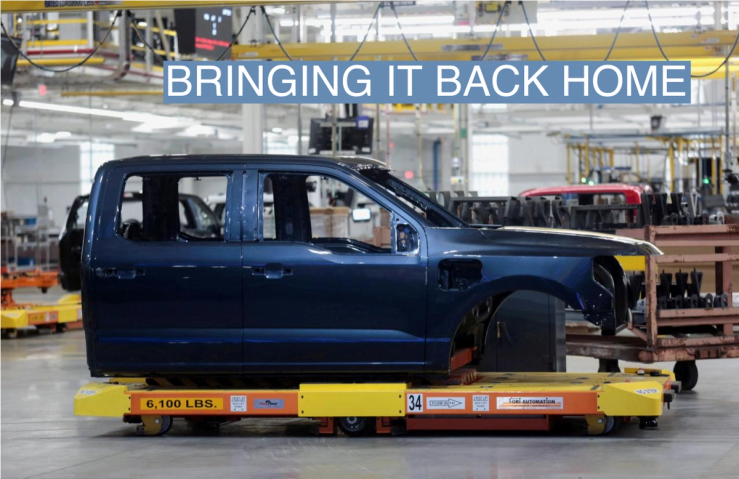Semafor spoke to White House deputy director of the National Economic Council Joelle Gamble on the Biden administration’s strategy for rooting supply chains out of China. This transcript is edited for clarity and length.
Q: What do you think about Ford’s decision to pause work on the Michigan battery factory? Do you think it has anything to do with some of the pushback to the company’s decision to partner with a Chinese company?
JG: I can’t speak to any company’s individual investment decisions or business decisions. But what we’re seeing across the board is a lot of investment in clean energy manufacturing, of course, and the construction of new facilities or the retooling of existing facilities. That’s been a trend for several months now. I see no change in that trend right now. We’re talking about hockey stick-like graphs where real spending on construction of new facilities and retooling of existing facilities has nearly doubled since 2021.
Q: Can you talk about what the White House is doing to get more battery production in the U.S.? Can we expect more rules restricting companies from working with Chinese firms?
JG: There’s essentially only two ways this [energy] transition can go: One way is to continue to allow China to essentially control the supply of key parts. The other choice is to invest in the United States and our partners and allies and our ability to build resilient supply chains. And the Inflation Reduction Act is a solid choice for the latter, for investing in the U.S., creating good-paying jobs. And as we implement the law, we’re continuing to make sure that that is the case. For example, beginning in 2024, eligible clean vehicles cannot contain any battery components that are manufactured by a foreign entity of concern. That’s one provision in the legislation that addresses the real fact that there are national security and economic security issues at stake here. So I would say that there’s more to do to implement the law, but it all really comes down to the choice that the president has made, which is to invest in the U.S. and not just allow our supply chains to be reliant on the PRC.
Q: What role is the White House playing in trying to reduce China’s dominance over the supply of critical minerals? The administration has inked deals with countries like Japan in this space. Could we see more deals like this with other countries?
JG: Even if you just look at batteries, China dominates every step of the supply chain, from extracting more than 75% of the world’s graphite to processing a majority of lithium, cobalt, and graphite supplies. Just completely dwarfing our partners and allies and the U.S. in production. So, what the president has been doing is a few things: One is making sure we are actually investing in our domestic capacity. We’re doing that through the Inflation Reduction Act, you see awards coming out of the Department of Energy and the Department of Defense that are designed to increase our domestic capacity. The president made the first-ever presidential determination to use the Defense Production Act in a climate context and this was to secure critical minerals supplies in the U.S. That’s why you’re seeing the Pentagon make these awards.
In addition to that, we know that domestic capacity alone is not going to get us where we need to be and to have real supply chain security and resiliency we need to work with our partners and allies. So, we are thinking strategically about the relationships we can build that are mutually beneficial for the U.S. and American jobs and for our partners who recognize the importance of supply chain security here. So both of those are a part of the strategy.
Q: Any particular countries that you’re looking at?
JG: I can’t speak to what might be next. Those are sensitive conversations, but we are thinking a lot about the countries that share our vision that are both important for being able to source critical minerals but also important partners in this geopolitical context that we exist in. We recognize that we need to be able to diversify supply chains away from the PRC because diversified supply chains are more resilient supply chains. They’re secure supply chains.
Q: Republicans like the former president, who is going to be in Michigan tomorrow, have suggested the administration’s policies on EVs will benefit China. There’s been some criticism from other Republicans about the lack of requirements around the foreign components in commercial vehicles under the IRA. What do you make of those criticisms and how do you respond to them?
JG: They are lying. The past administration spent a long time talking about China and jobs going to China and they did nothing about it. Not once did they make any investments in, for instance, our domestic critical mineral capacity. Under President Biden, we are making awards to a variety of companies across the country who are really trying to invest in a reliable supply chain that includes capacity here at home. Under President Biden, we are actually choosing to invest in our ability to produce batteries here that are important for electric vehicles but also batteries that are also important for other sorts of clean energy that are going to be critical to the energy future.
We’re making the investments and you see it in the data. You see it in real construction spending on these facilities, you see it in our broader foreign direct investment flows in which business isn’t going to other countries like it was under the last administration. We’re seeing investment flows come into the United States and create good-paying jobs here at home. So you can see hard evidence that the president is making the right choice here. Meanwhile, the Republican criticism is coming from a place of no action whatsoever. It’s just all talk.

